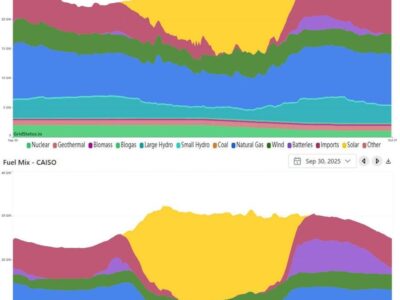The Emergence of Climate Law Courses
It’s an increasingly widespread law school course.
The U.S. legal system has only begun to address climate change in the past ten or fifteen years. It was inevitable that this subject would infiltrate basic environmental law courses, especially given that there have now been three Supreme Court cases on the subject. But climate change is now increasingly the subject of separate courses and seminars.
I recently conducted a survey of environmental law professors and found that almost sixty schools now have a regular offering on climate law. The full list is at the end of this post. It includes a wide range of schools in terms of geography (including schools in Australia, Canada, and South Africa). It includes schools from all levels of the U.S. News rankings. The list is surely underinclusive because some people may not have received the survey or didn’t respond.
It seems inevitable that there will be more climate classes as time goes on – not only will there be more law on the subject, but the subject will loom increasingly large in the real world. There may well be separate courses on mitigation (reducing carbon) and adaptation to climate change. My guess is that climate change will not only be the subject of separate courses, but it will also appear in various other parts of the curriculum. Climate may show up in the casebooks in securities law cases about whether corporations properly disclosed their exposure to climate risks, in contracts cases about carbon allowances, in constitutional cases about the power of states to regulate carbon, in IP cases about low-carbon technologies, and in property rights cases about coastal areas. Something as pervasive as climate change will necessarily pop up in many different legal contexts.
——————-
For those who are interested, here is the list of schools regularly teaching climate law in order of response: University of Minnesota Law School, University of Florida , NYU School of Law, Baba Farid Law College (Faridkot, India), Albany Law School, Cardozo School of Law, College of William & Mary, University of Houston Law Center, Lewis and Clark,William S. Richardson School of Law -University of Hawai’i, American University/Washington College of Law, Santa Clara University School of Law, Florida A&M College of Law , Syracuse Unviersity College of Law, Widener University School of Law, University of Mississippi School of Law, University of Missouri, Golden Gate University, School of Law Rutgers University – Camden, Ohio Northern University College of Law, UCLA School of Law, Stanford Law School, Vanderbilt University Law School, North-West University (South Africa), Rutgers University School of Law – Newark , Notre Dame ,Texas A&M University School of Law, Pace Law School, University of Oregon, UC Hastings College of Law, University of San Diego, Duke Law School, Ohio State University, UC Davis School of Law, University of Tulsa, Vermont Law School, Southern Methodist University, Suffolk University Law School, Hofstra Law School, University of Cincinnati, Temple University, Widener University School of Law,George Washington University Law School, Chicago-Kent College of Law, University of Miami School of Law, Florida State University College of Law, University of Colorado Law School, Boston College Law School, Australian National University, LSU Law School, University of Michigan Law School, Dalhousie University, University of Washington School of Law, UNC Chapel Hill School of Law, Charlotte School of Law, Columbia Law School.
Reader Comments
5 Replies to “The Emergence of Climate Law Courses”
Comments are closed.






Dear Dan,
As you know, climate law is sparse and weak. There are no statutes that specifically regulate greenhouse gases, instead we have flimsy regulatory “interpretations” and trifling lawsuits. President Obama’s proposed GHG regulations are an attempt to codify and strengthen climate laws, but these rules face stiff political opposition and will likely be abandoned altogether after the November elections. So-called “climate law” is vague, unofficial and generally unenforceable and that is why we can continue to freely emit large quantities of carbon dioxide without a federal environmental permit. After Obama’s proposed GHG regulations are finally defeated, there will be no tangible “climate law” in America.
How about Unicorn law, or Jackalope law? Lawyers are problem-solvers who, in providing services, deal with, and manage, facts — not politically correct fictions.
Russ Lapeer said:
“…Lawyers are problem-solvers who, in providing services, deal with, and manage, facts — not politically correct fictions….”
Dear Russ,
Statements like that could get an Attorney disbarred in California. I heard about an Attorney in Austin, Tx who claims to practice climate law. How do climate Attorneys earn money in the non-government private sector?
I don’t know how they earn money, bqrq. But there’s no question that they do. You will have to ask the attorneys at these firms, among many others in Texas alone:
http://www.martindale.com/Gardere-Wynne-Sewell-LLP/gp-lawyers-161957.htm
http://www.dwmrlaw.com/practice-areas/environmental-climate-change-law/
http://www.velaw.com/practices/Climate_Change_Law.aspx
Nowadays, law schools increasingly follow the needs of students to gain skills and knowledge to enter emerging and growing sectors of the legal profession, which means that we pay attention to law firms’ practice areas. While you seem very interested in belittling climate change law, or attributing it to something specific to California, the fact is that lawyers all over the country are practicing in this area. There is no consipracy or fantasy in that: law firms are profit-making enterprises and they see opportunities in this field.
The many lawyers who practice in this area would surely disagree with your comparison to unicorns or jackalopes. A simple Google search for “climate change attorneys” will confirm that this is a real – and thriving – practice area. Law firms would not pay their attorneys to practice in an field without clients interested in their services. Here’s just one example, the largest law firm in the country, by revenue: http://www.bakermckenzie.com/climatechange/
I don’t see this, in itself, as relevant to the scientific questions about climate change, but it sounds like the existence of so many climate-change lawyers might convince you that climate change is real, given your comment above.
What might be seen as stronger evidence that climate change isn’t a “politically correct fiction” is the fact that the largest players in the global insurance industry see climate change as a significant issue. Actuaries and underwriters see climate change as potentially driving significant economic losses: http://www.forbes.com/sites/kensilverstein/2014/05/18/rift-widening-between-energy-and-insurance-industries-over-climate-change/ These companies are keenly aware of how to attribute economic risks to various activities.